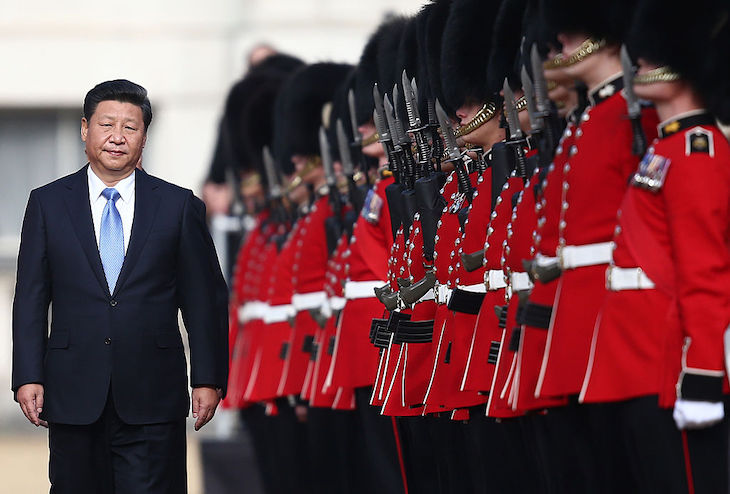Former Tory leaders are queuing up to take a pop at the government’s response to the Westminster spy story. Liz Truss has labelled China the ‘largest threat’ to ‘democracy and freedom’ after it emerged that a parliamentary researcher had been arrested on suspicion of spying for the Chinese government. Iain Duncan Smith suggested that ‘the problem lies in the mess we have got into over whether we define China as a threat or not’.
So far, the government is doing its best to sit on the fence. Rishi Sunak has said he ‘will not accept’ Chinese interference in the UK’s democracy, but has refused to go much further. Deputy Prime Minister Oliver Dowden insisted ministers were ‘clear eyed’ about the challenges posed by Beijing, but added it was not realistic to ‘completely disengage’ with the country. It means there is little prospect for now of China being classed in the ‘enhanced tier’ of the Foreign Influence Registration Scheme, which would require further checks on China-linked organisations operating in the UK.
It would be hard to suggest, of course, that Duncan Smith and Truss represent high points of Conservative leadership in the 21st century. But on this matter they do have a point – even if it’s also true that they are failing to see the wood for the trees when it comes to wanting to crack down on China. The semantics of the matter – whether the government formally states that China is a ‘threat’ to the UK or not – matters less than two other factors. The government’s policy towards China must be realistic, and it must be co-ordinated.
This realism is important. The arrest of a parliamentary passholder, while hardly a seismic shock to compare to the Dreyfus affair, demonstrates that the Chinese régime is willing to conduct espionage against the UK and to show little anxiety about being caught. It is unlikely that there is much hesitation in the Politburo in Beijing over sanctioning operations against us on the grounds of potential embarrassment, or the optics of how they define their relationship with us.
The government needs to understand this and change course accordingly. Whether we openly describe China as a ‘threat’ or a ‘hostile state’ matters less than understanding that it is just that, at least to an extent. The regime in Beijing will probe our weaknesses, and will take advantage of any lapses in our security. This does not mean we must treat China as an international pariah, or recall our ambassador. We can even try to maintain a working economic relationship with the People’s Republic, so long as Whitehall remembers the blunt and brutal truth.
Secondly, the government has to develop a coherent narrative which explains our relationship with China. Strategic communications are vital in foreign policy, a central plank of how we do business with other countries rather than just glitter strewn across the surface. For our military operations against Islamic State in Syria and Iraq, allied with the US in what they call Operation Inherent Resolve, the Foreign and Commonwealth Office hosted a Global Coalition Communications Cell; this body co-ordinated publicity across the coalition to ensure consistency. It worked to ‘counter and undermine terrorist propaganda, damaging the perception of Daesh (Isis) and reducing its ability to recruit’.
This is what we must do with regard to China. We need a story that ministers and officials can tell. It must explain the complexities of our relationship with China, make clear the threat (or ‘challenge’, if ministers insist) that the PRC represents, as well as what we are doing to meet it, and set that threat within the broader context of economic relations. We must also work hard to fight the misinformation and disinformation in which the Chinese deal so casually. The Foreign Secretary can still go to Beijing, meet with Chinese leaders, so long as we are explicit about the issues that divide us, rather than trying to paper over yawning cracks.
Our China strategy should also champion the values that are fundamental to us, at home and abroad, and which should define us: the rule of law, freedom of speech and assembly, personal liberty and respect for human rights. These underpin our interaction with the global community and represent some of our most significant disagreements with China, and the public knows this. What voters do not like is watching politicians say things they know they do not mean. The language of diplomacy must sometimes forgo polite nuance in favour of clarity, transparency and openness.
We have one straightforward but overwhelming advantage over the People’s Republic of China: we are on the right side of history. The arc of the moral universe is long, but it bends toward justice, towards democracy, towards freedom. It bends away from autocracy, oppression and control, and it is clear to which side China has committed itself. If we say this consistently and clearly, then we do not need to shout it. Our values, our purpose, our realism but our promotion of free speech, free markets and a free society, are powerful enough.







Comments